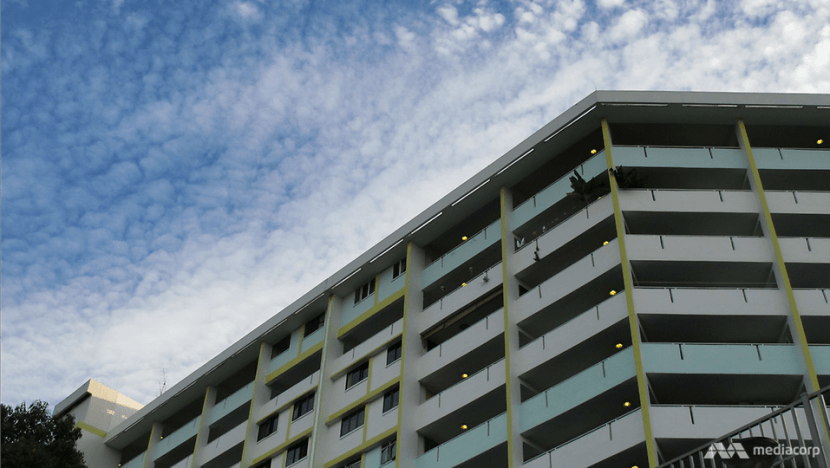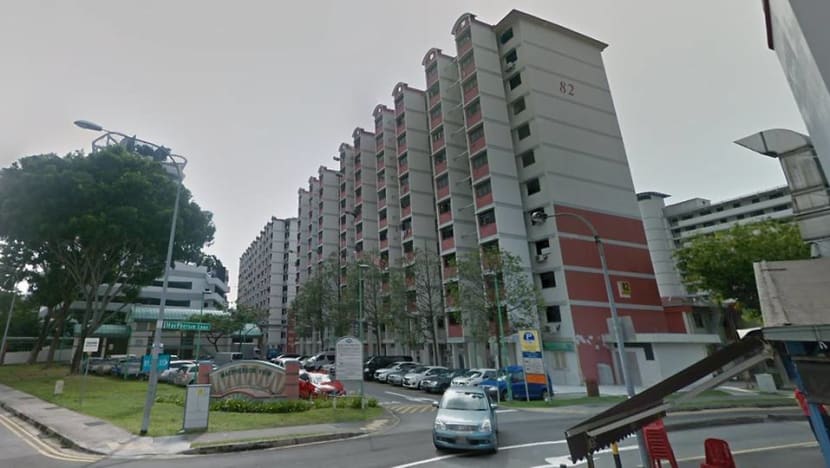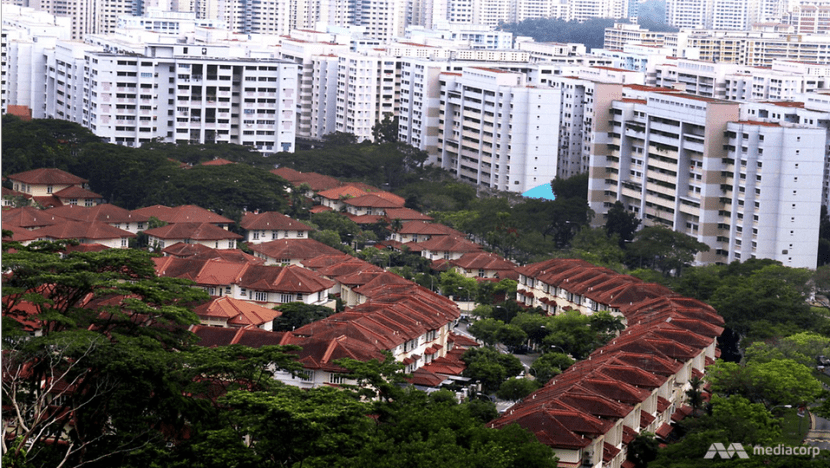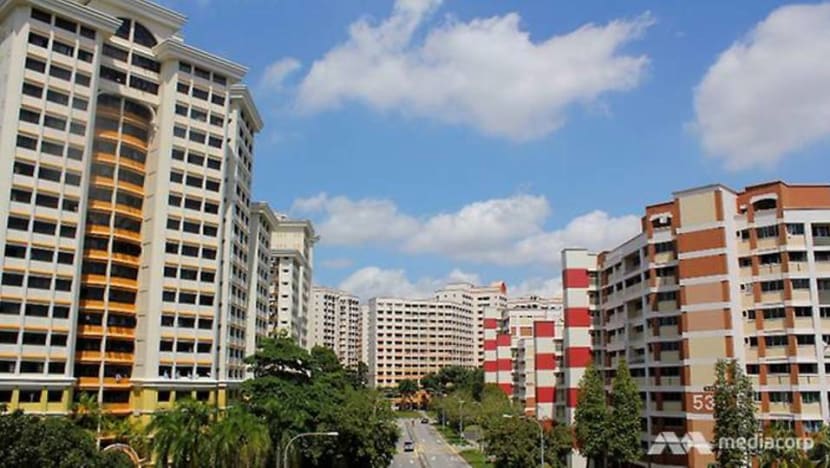commentary Commentary
Commentary: What a ‘Housing Redevelopment Board’ will do for mature estates
An imagined Housing Redevelopment Board may have more schemes to provide more options for home owners to monetise their old flats but the housing announcements at the National Day Rally provides a heartening start, say two observers from the NUS Institute of Real Estate Studies.

File photo. (Photo: Jeremy Long)
SINGAPORE: “We will continue to transform our city … and in 30 to 40 years’ time, we will rebuild our existing towns,” said Prime Minister Lee Hsien Loong at this year’s National Day Rally (NDR).
“HDB will be very busy. They may have to change their name to HRB – the Housing Redevelopment Board,” he quipped.
PM Lee also announced the expansion of the Home Improvement Programme (HIP II) and a new Voluntary Early Redevelopment Scheme (VERS) at the same event, measures that may provide some respite to confused HDB home dwellers concerned with the growing uncertainty of the value of their 99-year leases.
READ: Strong political commitment to housing is precisely what younger Singaporeans need, a commentary
VERS A KEY LEVER
VERS will be a key lever for an imagined, future Housing Redevelopment Board, but it has been carefully designed to factor in a community’s collective choice on housing as flats age.
VERS takes on a very similar approach as the en bloc scheme for private properties, except public housing flats in selected precincts will only be returned back to the Government if residents vote “yes” to the scheme.
The compensation from the VERS will allow residents to pay for another flat or keep the money for their retirement needs.
However, residents who wish to continue to live in their flats until their leases expire could vote “no”. As this scheme is still a work-in-progress, details of the selection criteria of precincts, majority voting rules, compensation, and many more have yet to be ironed out.
Will VERS stick to the minimum of 80 per cent consent needed to proceed, just like in the private en-bloc scheme, or will the bar be higher? How high is high enough?
Should flats be taken back by the Government in VERS, will home dwellers be given replacement flats in nearby estates as is the case in the current selective en bloc redevelopment scheme (SERS)?

VERS is part of the Government’s long-term plan to redevelop some of the oldest HDB housing estates, including Marine Parade, Ang Mo Kio and Toa Payoh that were built in a “rush” during the peak of the housing construction programme from the 1960s to the 1980s.
When clusters of flats in these HDB estates reach 70 years simultaneously, some of the flats will be taken back through VERS, while other flats, where VERS was rejected, could be upgraded through HIP II.
Regardless of the decision made by each precinct, we may expect many to say yes. What this means on a national level is that VERS will enable the Government to phase and pace out estate redevelopment in a more systematic and planned manner, avoiding the same costly construction rush in Singapore’s early years.
SERS AN EXPENSIVE AND RARELY APPLIED LEVER
But there’s also the Selective En Bloc Redevelopment Scheme (SERS). While, unlike VERS, it remains highly selective and applicable to only a small percentage of HDB flats in Singapore, SERS is a harder urban redevelopment tool that allows the Government to acquire the land on which aged flats sit on without requiring residents to vote.

But the high costs, which includes ensuring residents have a replacement flat in the vicinity to move to, suggest this tool will remain limited to high-potential precincts in mature HDB estates.
Indeed, the compensation for SERS is very generous and assistance to move to another house is extensive. When the Government identifies a precinct to carry out SERS, home owners will be notified early and compensated based on the market value of their flats at the time of the SERS announcement.
Home owners can use the proceeds to take up a new 99-year lease flat at a designated replacement site, apply for a flat from a HDB sale launch, or sell or transfer their flat with rehousing benefits. If they choose not to take up SERS rehousing benefits, they would receive up to S$30,000 as an ex-gratia payments on top of their SERS compensation.
READ: A tale of one HDB flat across two generations, a commentary
Still, home owners should not assume all HDB flats entering the final stages of their leases are eligible for this SERS scheme. While there are still opportunities for SERS to take place in the coming years, projects with the highest redevelopment potential have already carried out SERS and selected flats make up only 4 per cent of the HDB stock.
LESSONS FROM THE PRIVATE MARKET EN BLOC SALES
Perhaps an imagined Housing Redevelopment Board can design details of the newly-announced VERS scheme by drawing some lessons from the en bloc sales in the private housing market.
In the same vein as what VERS intends to do in the public housing market, en bloc sales ensure that Singapore’s private housing scene remains dynamic and keeps abreast with Singapore’s urban renewal plans - by allowing owners of either strata units in private non-landed residential developments or houses on contiguous land plots to come together to jointly sell redevelopment rights of their land to private developers.

En bloc deals can be a lucrative affair for home owners in land-scarce Singapore, if their existing land have not reaped their “highest and best use” potential.
But what tempers profit-driven property developers, who may fork out large sums of money to entice home owners into agreeing to an en bloc sale scheme, is the profit motive. They will do their sums to ensure they can still profit from future redevelopment of the en bloc site.
On the flipside, VERS is a Government-initiated project that utilises public funds to carry out a buyback scheme. Therefore, the compensation the Government forks out for home owners has to be prudent.
Policymakers are also mindful that overly generous compensations could risk sparking a demand frenzy in the public housing market, which may raise prices for the new flats built on sites that have undergone VERS, and go against their goal of providing affordable housing for Singaporeans.
REJUVENATION OF A NATION'S HOUSING
VERS, SERS and en bloc all involve efforts that rejuvenate neighbourhoods in Singapore. The sum of their effects is to renew Singapore’s housing stock and upgrade residential properties to match home owners’ changing needs.
All three schemes aim at preserving home owners’ housing wealth, by unlocking and partially distributing value from a better use of land back to home owners.
It is inevitable that the newly-announced VERS may attract some over-zealous buyers to speculate on HDB flats they think may potentially fall under VERS in the coming years. But such unhealthy, rent-seeking behaviour could crowd out other home buyers who want to live out their lives in those neighbourhoods.
READ: Windfalls and bailouts should not be an expected part of the public housing equation, a commentary

Buyers may reap some monetary benefits, if they together with the majority of other residents vote for the VERS when selected. But because the compensation is unlikely to be as much as those under SERS, buyers should heed caution and avoid relying on VERS to be bailed out.
Much work lies ahead for the authorities in ensuring that Singapore’s housing markets remains affordable and sustainable in the long run, not just in regulating unhealthy speculation in the property market but in the less eyeball-grabbing role of renewing the housing stock for future home owners.
What the Government has done at the National Day Rally is to chart out a path and give themselves leeway to plan for and redevelop new housing estates in Singapore, in anticipation that some public housing leases will run out at the same time and home owners will need time to think about whether to say yes to VERS.
An imagined Housing Redevelopment Board may have more schemes to provide more options for home owners to monetise their old flats but this is a heartening start.
Meanwhile, any new, suitable policy that preserves the housing wealth for HDB owners, who make up more than 80 per cent of the general public, will certainly attract the media spotlight and be closely scrutinised.
Sing Tien Foo is Director of the Institute of Real Estate Studies, National University of Singapore. Amanda Tang is currently pursuing a postgraduate degree in Human-Environment Relations at Cornell University.















